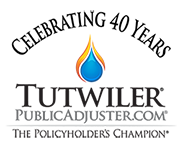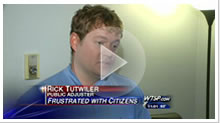Don’t be victimized in the adjustment and repair replacement process resulting from hail damage. It just makes good sense to have a public adjuster handle your hail damage claim to make sure you are properly compensated for your hail property loss. Filing a property insurance claim and successfully recovering your financial loss from hail damage can be quite challenging given the many insurance policy coverage issues that arise and the discretionary nature of the insurance adjusting process. Don’t depend on the insurance company to tell you what they want to pay you. Many adjusters and the insurance companies they work for may have different adjusting standards outlined in their respective claim department manuals. If a hailstorm is severe enough, visible damages should be obvious and undisputed by the field adjuster inspecting the damages and thus coverage of the loss should be confirmed early on in the process. This is the easy part. Unfortunately, we get calls from policyholders who are offered partial repairs of roof and siding rather than proper replacement.
With many hail claims, there will be other issues you will face such as the scope of damages and the dollar amount your insurance adjuster says you are going to get paid given the insurance policy terms and conditions. Often, the assigned insurance adjuster’s training, experience and knowledge of this type of adjustment process will play a very important part in how your claim is both valued and settled.
A common issue that arises is if you will be paid to replace the complete roof or if a patch job will be offered as a partial repair. The next question is if the insurance adjuster will apply depreciation to your roof and if so, is it fair and reasonable? While auguring over the scope of loss and price of the repair may seem like a good thing, (at least the insurance company acknowledges that you have a covered loss) there are many other cases where the insurance company will dispute that the damages were even caused by hail, claiming previous wear and tear. This is a common dodge that we see all over the country and this is where you may need the professional help of a public adjuster that will represent your best interests and be able to get technical with your insurers claims staff.
Remember, knowledge and information is power. Do you know the questions to ask as well as what you are entitled to in an insurance loss adjusting process from a hail event? If you have hail damage to a modified bitumen roof, a build up roof, sprayed polyurethane foam application, metal roof, cedar shake roof or any number of tile roofs, chances are you have recoverable damages as a result of a severe hail event in your community. Read our article on How Hail Damage Effects Different Roof Types. Your roof is one the most important building components of your property. You need to have the damages documented and the adjustment process completed professionally to get you properly indemnified for your loss. A fair and honest settlement to properly fix your roof damage and any other siding property damage is not only important to protect your biggest property investment but should also be in the best interest of your insurance company as well.
See our Frequently Asked Questions About Hail Damage to review some common questions and issues that come up in major hail events that we have been involved with over the years. If you would like help with your hail damage insurance claim and want to understand your options, give us a call at 813-412-8357 or contact us.


